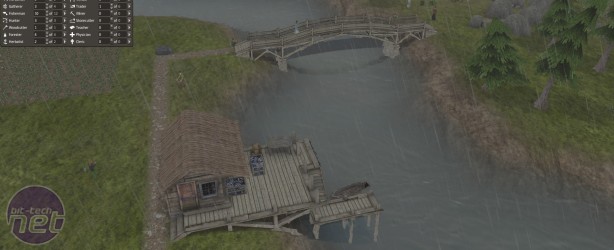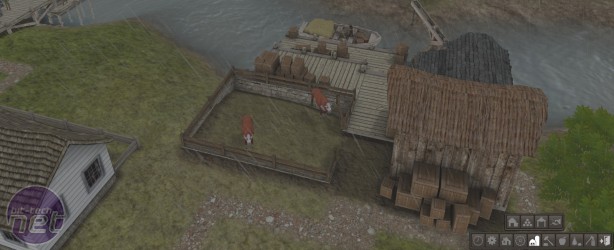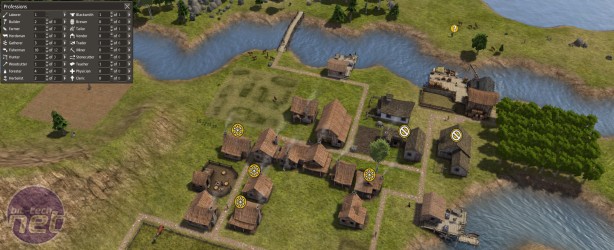
Still it's the simulation and how you interact with it that counts, and Banished's simulation impresses in its attention to detail. Your processor's crunching of numbers is replicated precisely by what's happening on screen. So when you build a fishing hut, your builders first take all the resources required from the stockpile to the building site before construction begins. Once the hut is complete, the fisherman you assign to work there walk from their home to the hut, and take their catch from the hut to the storehouse. The same goes for moving leather to your tailors for the fashioning of new clothes, iron and wood to your blacksmiths for the forging of new tools, goods for sale from the storehouse to your trading post, and so on and so forth.
The game's interface isn't the most attractive in the world, and overly fond of tiny buttons. But it's easy to work with once you've been through the tutorials. It also bears a few neat features, such as the ability to highlight paths your villagers take between buildings, enabling you to increase the efficiency of your town. Aside from building a school to educate your workers for increased productivity, however, good town planning is about the only way efficiency can be improved, and that will only get you so far.
At first Banished feels relaxed, but the pace soon slows to being outright ponderous. Even with the game speed at 5x faster than normal, it can take a long time to construct a single building, especially once your immediate surroundings have been cleared of their natural resources. This slowness stems from several areas of the simulation. Your villagers consume copious amounts of food, and up to two-thirds of your workforce will be focussed on food production, leaving few in the pool for generic labour such as collecting resources and transporting goods.
Moreover, expanding your population too quickly by building houses will almost instantly result in starvation, again strictly limiting your workforce and therefore dragging out the time it takes to get things done. Then there are certain buildings, like huntsman's lodges and forestry complexes, that by necessity must be placed away from civilisation. This can't be helped. What can be helped is the fact that your villagers carry all of their supplies in their hands, limiting their speed and carrying capacity. Annoyingly, your merchants use wheelbarrows to carry items from storage to your trading post, but there's no way to spread the technological wizardry of wheels to your other villagers.
And I think, ultimately, that's the main failing of Banished. You're not building this city for your people to live in, you're building it so you can build more city. There's no real reason to care about the happiness of your villagers, their moods and wants and hopes. They're human traffic, cogs in your medieval machine. Sure, you can eventually build a church for them, and if they're really lucky, a tavern. But ultimately they exist only to fill your houses.
There is a quiet, smouldering pleasure to be gained from Banished, provided the randomised world-seed falls nicely. Watching your town grow and prosper is inevitably enjoyable. But it's too darned slow and lacks a human touch to make it truly compelling. Banished doesn't deserve to be exiled from your hard-drive, but it's no cause to bring out the bunting either.
The game's interface isn't the most attractive in the world, and overly fond of tiny buttons. But it's easy to work with once you've been through the tutorials. It also bears a few neat features, such as the ability to highlight paths your villagers take between buildings, enabling you to increase the efficiency of your town. Aside from building a school to educate your workers for increased productivity, however, good town planning is about the only way efficiency can be improved, and that will only get you so far.
At first Banished feels relaxed, but the pace soon slows to being outright ponderous. Even with the game speed at 5x faster than normal, it can take a long time to construct a single building, especially once your immediate surroundings have been cleared of their natural resources. This slowness stems from several areas of the simulation. Your villagers consume copious amounts of food, and up to two-thirds of your workforce will be focussed on food production, leaving few in the pool for generic labour such as collecting resources and transporting goods.
Moreover, expanding your population too quickly by building houses will almost instantly result in starvation, again strictly limiting your workforce and therefore dragging out the time it takes to get things done. Then there are certain buildings, like huntsman's lodges and forestry complexes, that by necessity must be placed away from civilisation. This can't be helped. What can be helped is the fact that your villagers carry all of their supplies in their hands, limiting their speed and carrying capacity. Annoyingly, your merchants use wheelbarrows to carry items from storage to your trading post, but there's no way to spread the technological wizardry of wheels to your other villagers.
And I think, ultimately, that's the main failing of Banished. You're not building this city for your people to live in, you're building it so you can build more city. There's no real reason to care about the happiness of your villagers, their moods and wants and hopes. They're human traffic, cogs in your medieval machine. Sure, you can eventually build a church for them, and if they're really lucky, a tavern. But ultimately they exist only to fill your houses.
There is a quiet, smouldering pleasure to be gained from Banished, provided the randomised world-seed falls nicely. Watching your town grow and prosper is inevitably enjoyable. But it's too darned slow and lacks a human touch to make it truly compelling. Banished doesn't deserve to be exiled from your hard-drive, but it's no cause to bring out the bunting either.
-
Overall60 / 100


MSI MPG Velox 100R Chassis Review
October 14 2021 | 15:04












Want to comment? Please log in.